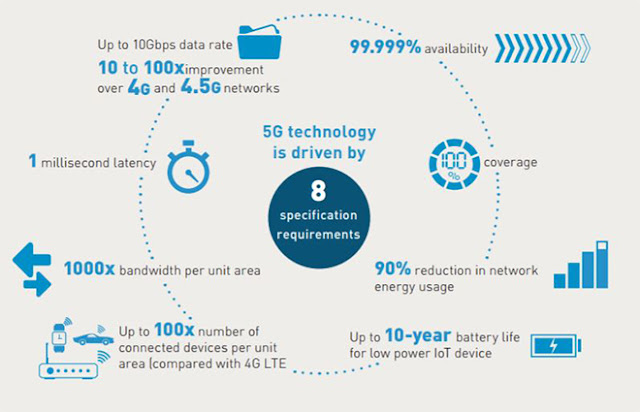Everything About 5G
What is 5G?
The next generation telecom networks (5G) will hit the market by 2020. Beyond just speed improvements, 5G is expected to unleash a massive IoT ecosystem where networks can serve communication needs for billions of connected devices, with the right trade-offs between speed, latency, and cost.
5G networks are the next generation of the mobile internet network, offering faster speeds on smartphones and other devices than ever before.
Combining cutting-edge network technology and the very latest research, 5G should offer connections that are multitudes faster than current connections.
The networks will help to power a huge rise in the Internet of Things technology, providing the infrastructure needed to carry huge amounts of data, allowing for a smarter and more connected world.
How fast will 5G be?
It’s still not exactly known how much faster 5G will be than 4G, as the technology is still under development.
That being said, the networks should provide a significant upgrade to current download and upload speeds - with the GSMA proposing minimum download speeds of around 1GBps.
Most estimates expect the average speed of 5G networks to reach 10Gbps.
This would mean that users could download a full-length HD quality film in a matter of seconds and that downloading and installing software upgrades would be completed much faster than today.
What will 5G networks mean for me?
- Faster download and upload speeds
- Smoother streaming of online content
- Higher-quality voice and video calls
- More reliable mobile connections
- A greater number of connected IoT devices
- An expansion of advanced technologies - including self-driving cars and smart cities
Will I be able to get 5G networks on my phone?
Existing smartphones, tablet or other devices that were released when 4G networks were the standard may not be able to continue with 5G.
However, following the 2020 deadline for the initial rollout, we should soon see devices coming with a 5G connection as default.
Don't worry though 5G should represent a major step up from current 4G networks, the new technology won’t immediately replace its predecessor.
Instead, 5G should link in with existing networks to ensure users never lose connection, with the older networks acting as the back-up in areas not covered by the new 5G coverage.
Once launched, however, implementing 5G may be a slower process. Much like the gradual takeover of 4G networks from the previous generation, existing network infrastructure may need to be upgraded or even replaced in order to connect with the new technology, homes, and businesses may also need to get new services.
It’s not yet known how 5G networks will take over from existing networks, but again, much like the rollout of 4G, you may not be able to immediately connect to the new networks without upgrading your technology.
Which companies are working on 5G?
Development of 5G is being led by companies such as Intel and Qualcomm for modem technology and Nokia, Huawei, Ericsson, ZTE, and Samsung for infrastructure. AT&S is supporting the current roll-out of the 5G mobile communications generation with high frequency optimized interconnect solutions by developing and producing hybrid-printed circuit board structures.
5G technology is expected to officially launch across the world by 2020
Many companies are busy making sure their networks and devices are '5G ready' in time for 2020, means some networks may launch before...








No comments:
Post a Comment